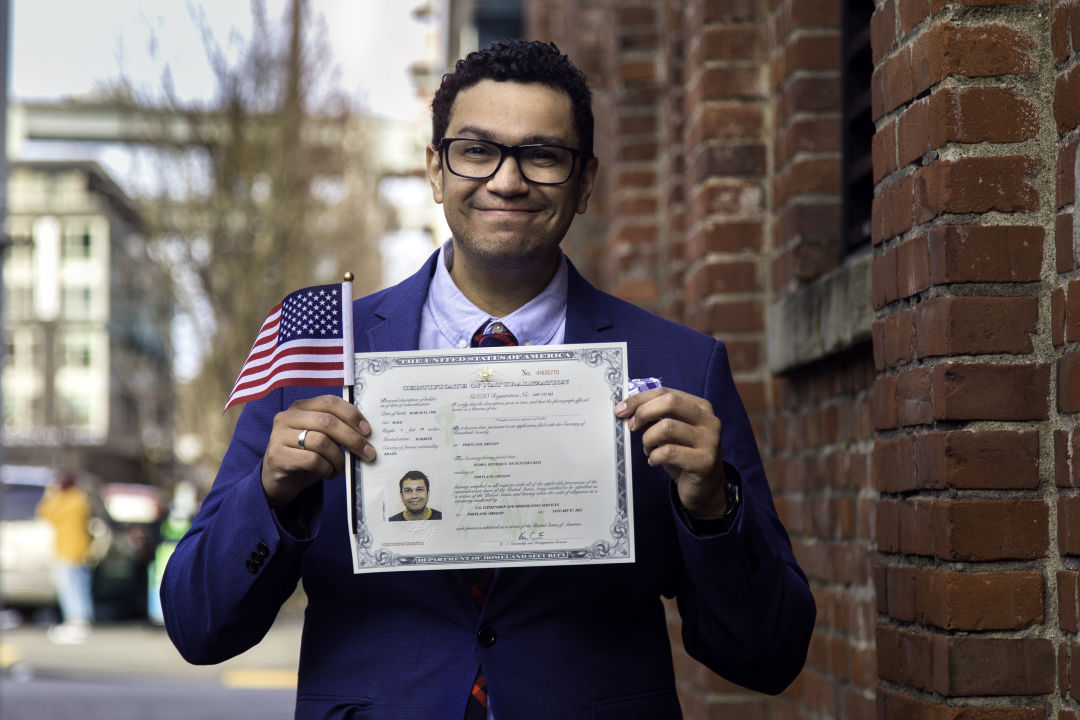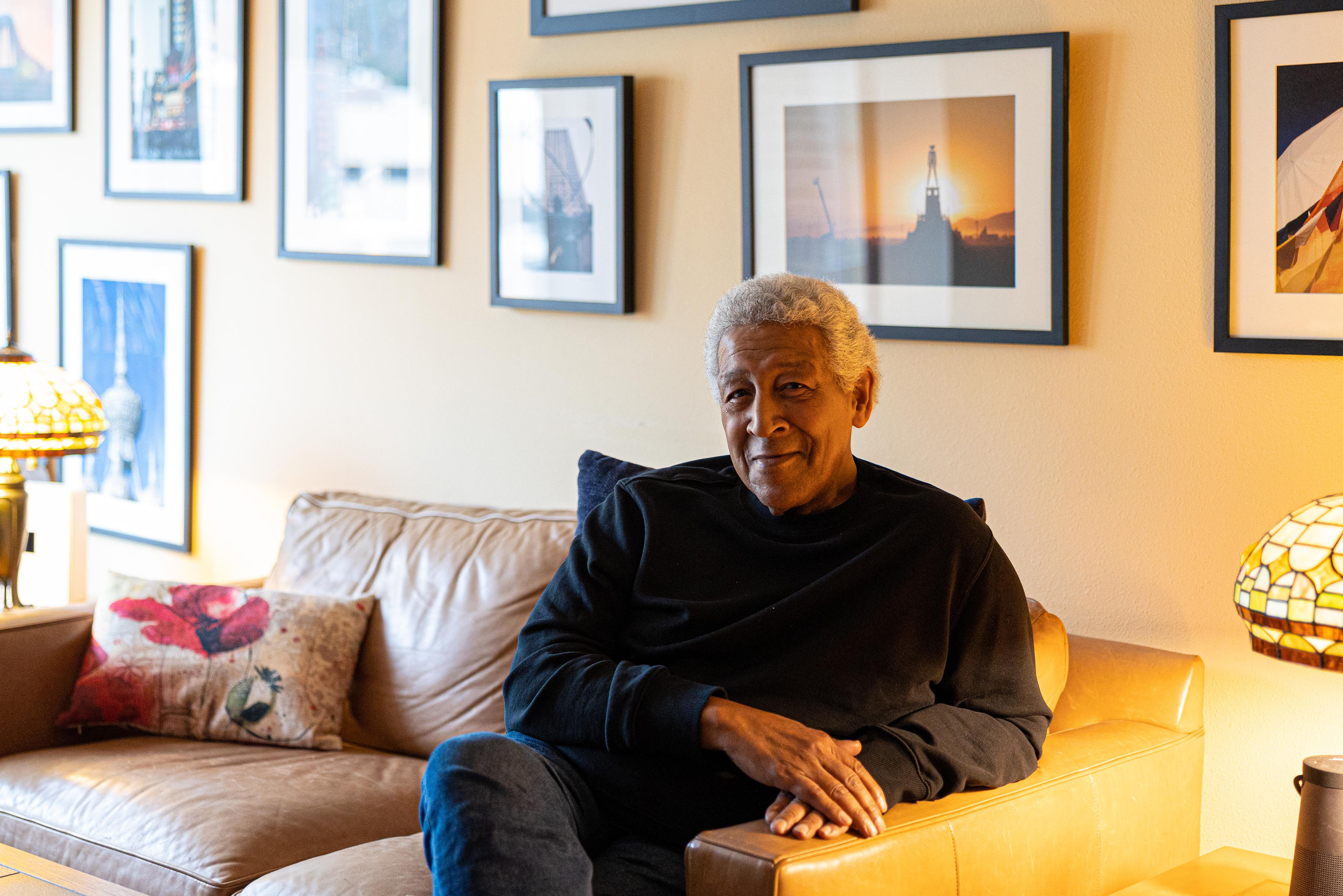This Portland Photographer Became a US Citizen the Day after Insurrectionists Stormed the Capitol

Image: Pedro Oliveira
On January 7, 2021, prolific local photographer Pedro Oliveira was told, “You are now a citizen of the United States.” At age 31, he'd checked off one of the biggest milestones in his life, despite the tragedy that occurred a day before his ceremony.
On January 6, insurrectionists stormed the United States Capitol, leaving the country in a whirlwind of emotion and shock. After eight years of anticipating becoming a US citizen, Oliveira asked himself, “Do I really want to be a citizen of this country?”
Where did you grow up, and when did you come to the United States? Who inspired you to do so?
I grew up in Brazil, São Paulo, in a small town called Pedro de Toledo, and I moved here when I was 22. My relationship at the time went bananas, so I was already in the process of looking for somewhere to move. I found this place called Atlanta, Georgia. I moved there to learn English.
How long have you been in Portland? How did you end up here?
I moved here in the end of 2013. Eventually, my partner and I met and we developed a relationship and got married, and here I stand. We stayed in Atlanta about 10 to 11 months. I wasn’t very much fond of Atlanta, to be honest. About eight or nine years ago, [it was] still a pretty conservative place for a brown immigrant with no English, or little English. We came here in summer, and you know how summers in Oregon are—it’s a trap! My partner's son was living here and his first granddaughter was born—family is here, we like Portland, and that was the move.
You’re a photographer. Do you remember your first camera?
I do remember. How can you ever forget your first camera? It was a Canon Rebel T3i.
Tell me about your photography career.
Being a Brazilian, used to sunshine, I got pretty down because of the winter and I did not have friends and I could not make friends because I did not speak English well. That was before a friend of mine let me use his camera, and I thought it would be cool to just have a camera to start photography as a hobby. I just started photographing everything.
I don’t know if you believe in destiny. I don't know for sure if I believe in destiny. I was at [the Park Blocks] in front of my apartment on Park Avenue, and I was looking for squirrels. Any given day, any time of the year, there’s so many squirrels in this park. And for some reason, that day, I could not find a single squirrel. For hours, I was sitting there and nothing happened. I was so frustrated, I sat on this bench and next to me, a homeless guy starts talking and is interested in the camera.
I ask if he wanted to hold the camera and he was pretty scared of breaking the camera and I said, “No, you don’t have to be scared.” Giving the camera, he eventually takes a picture of me. A good picture, I still have it. I said, “Now, it’s only fair if you let me take a picture of you.” Which I do, but instead of taking it on the bench where we are, I put him in front of this church.
Later on, I found out it’s called St. James Church and this guy’s name was James. Pure random coincidence. I took this portrait, about six, seven years ago, and Facebook was very active. So I posted this one picture on this Facebook photography group, and overnight it got 1,600 likes. I was like, “Oh, people really like my stuff.”
I liked the idea of photographing people. A few weeks later, I met a second person whose name was Jimmy. I was going to school for journalism, so I decided instead of just posting the picture, I would narrate Jimmy’s story. I thought I could make a project out of this and just kept doing it whenever I would come across an interesting face. I would have a 10- to 15-minute interaction and take one or two pictures, Photoshop the picture, narrate the story. After doing this for quite a while, I would say six or seven months, Street Roots published my story on the cover.
[Then] people start to ask if I would photograph them for money. And that’s when I rang the bell: “Hold on, so I can make money out of photography too?” That was when I was like, yes, this is something I want to do for a living.
What was the turning point in your photography career?
I’m still in this turning point. The comparison I can make is like professional sports. You start playing for fun and then you start playing weekend games and suddenly you’re playing high school. Then you’re playing college football and eventually, maybe you’ll make it to the NFL. But even if you make it the NFL, odds are it’s going to take a long time for you to become a Tom Brady. I was taking pictures for fun, then I start making 50 bucks per shoot, and eventually I started getting local contracts. I’ve been shooting for about six years, but on the level I’m playing now it’s pretty recent. It’s [been] about 20 to 24 months that I’m shooting for international brands. I’m shooting for Forbes, the Guardian, and big names.
When did you decide to pursue citizenship? What did that process look and feel like?
I’m here legally, but I’m still an immigrant. I don’t forget that. Donald Trump was the reason, to be simple. I had just gotten my green card and I had about nine years left. After seeing all this mess with immigration, caging kids, this entire craziness of canceling Muslims, I grew so uneasy. [It] was, “I better get my citizenship because there’s no way this lunatic is going to do something that can jeopardize my life here.” I moved here when I was 22, so most of my adult life was spent here in this country, so it’s all I know. All my friends, my favorite restaurants, the people I love, my family, everything is here.
Second, my motivation was, “I want to vote.” I want to be able to do as much as I can to get rid of this evil. When all this turmoil was happening, that’s when I needed to get my citizenship.
I applied in 2019. It took a year and half, and the process is costly, to begin with. My partner is a lawyer, so I don’t have to pay the lawyer fees, and still, we had to pay thousands of dollars. Just for the application, I paid $600 to $700. I refute every statement this man made, “Yeah, if you are in a war zone and if you are being chased by the cartel, just apply.” If you are running from a drug lord, you don’t have the time or the means to pay for that. I call that baloney.
I saw your Instagram post about becoming an American citizen. Could you walk me through that day? What was running through your mind?
Hearing “You are now a citizen of the United States” was more than a symbolic thing for me. It was the moment I could take a deep breath and say, “There’s absolutely nothing this man can do now.”
Obviously, you can’t feel proud 100 percent of becoming a citizen of a country when we were watching what we were watching. A cop got killed and four other people became casualties and one got shot trying to invade the [congressional chambers]. You start wondering. If you’re moving to a town, as a metaphor, and you’re just parking your car and you see the town burning on fire, you start wondering, ‘Do I really want to move to this town?’ That’s how I felt. Do I really want to be a citizen of this country? You’re told time and time again this is the greatest country of the world, the greatest nation, and all the sudden you’re seeing people destroying one of the biggest symbols of this country.
In a post, you wrote, “I love this country as if it were my own, despite all its flaws.” Could you talk more about what this means for you?
I complain a lot about this country, I do. You know when you have a child? The worst thing you can do for a child is play as if the child is the perfect angel child. To raise a kid right, you got to point out the problems and fix them and work on that.
I feel a lot of flaws, even more so now. Denying those flaws is denying the existence of the problem and, therefore, not working on them. This is home. This is practically where I became a man. Even though I have an accent, English is my primary language now. All my friends that I would give my life for live in this country. My family lives here. I won’t deny that we have a lot of problems. We are not by any means, shape or form, the greatest country on the planet, but home is home. I love this country for the home it’s been for me. The opportunities I had as a professional as a human being, all came from here.
Home is home.




